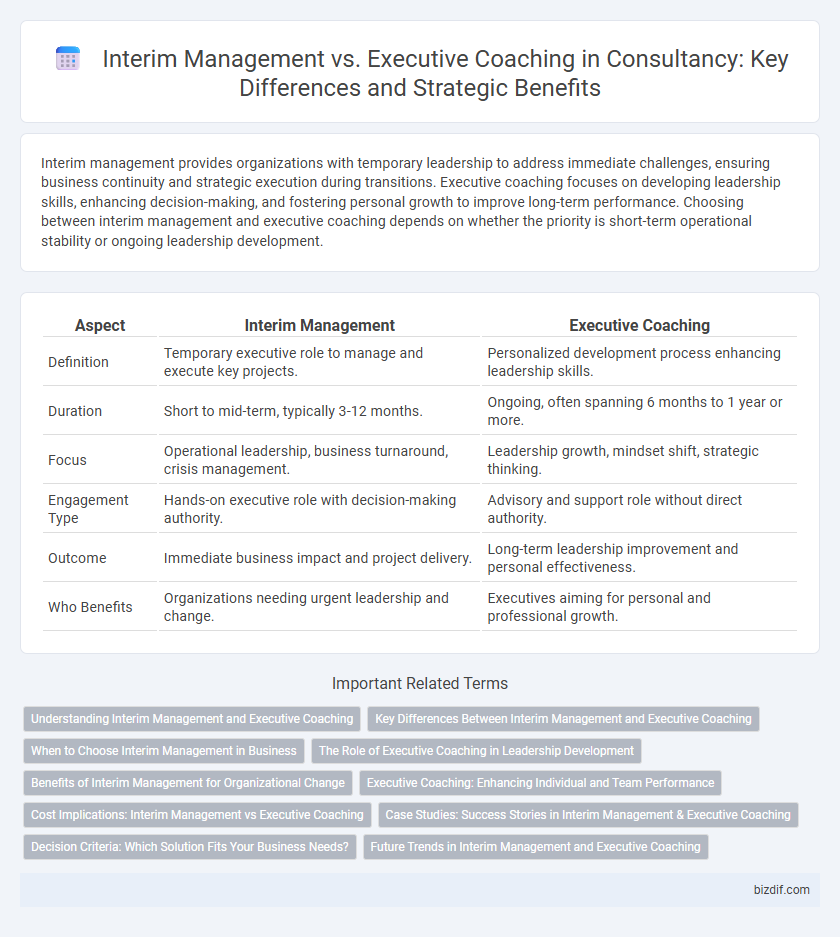Interim management provides organizations with temporary leadership to address immediate challenges, ensuring business continuity and strategic execution during transitions. Executive coaching focuses on developing leadership skills, enhancing decision-making, and fostering personal growth to improve long-term performance. Choosing between interim management and executive coaching depends on whether the priority is short-term operational stability or ongoing leadership development.
Table of Comparison
| Aspect | Interim Management | Executive Coaching |
|---|---|---|
| Definition | Temporary executive role to manage and execute key projects. | Personalized development process enhancing leadership skills. |
| Duration | Short to mid-term, typically 3-12 months. | Ongoing, often spanning 6 months to 1 year or more. |
| Focus | Operational leadership, business turnaround, crisis management. | Leadership growth, mindset shift, strategic thinking. |
| Engagement Type | Hands-on executive role with decision-making authority. | Advisory and support role without direct authority. |
| Outcome | Immediate business impact and project delivery. | Long-term leadership improvement and personal effectiveness. |
| Who Benefits | Organizations needing urgent leadership and change. | Executives aiming for personal and professional growth. |
Understanding Interim Management and Executive Coaching
Interim management involves placing experienced professionals in temporary leadership roles to drive change, manage crises, or fill executive gaps, ensuring continuity and strategic execution within organizations. Executive coaching focuses on personal and professional development through tailored guidance, enhancing leadership skills, decision-making, and performance improvement for individual executives. Understanding these approaches highlights that interim management addresses immediate organizational needs, while executive coaching aims at long-term leadership growth and capacity building.
Key Differences Between Interim Management and Executive Coaching
Interim management involves temporarily filling leadership positions to drive organizational change or manage transitions, while executive coaching focuses on developing an individual's leadership skills and personal growth over time. Interim managers take on direct decision-making responsibilities, whereas executive coaches provide guidance and support without assuming operational control. The key difference lies in the engagement scope: interim management delivers hands-on management during critical periods, and executive coaching facilitates long-term professional development.
When to Choose Interim Management in Business
Interim management provides immediate leadership during critical transitions such as mergers, restructuring, or sudden executive departures, ensuring operational stability and strategic direction. It is ideal when businesses require a results-driven, hands-on expert to manage complex projects or turnaround situations within a limited timeframe. Choosing interim management benefits organizations seeking rapid implementation and tangible outcomes without long-term commitments.
The Role of Executive Coaching in Leadership Development
Executive coaching plays a pivotal role in leadership development by providing tailored guidance that enhances decision-making, emotional intelligence, and strategic thinking in senior leaders. Unlike interim management, which temporarily fills leadership gaps to maintain operational continuity, executive coaching focuses on long-term personal and professional growth. This targeted development fosters sustainable leadership capabilities that drive organizational success.
Benefits of Interim Management for Organizational Change
Interim management provides organizations with rapid access to experienced leaders who drive strategic change and manage complex transitions effectively. These professionals deliver hands-on expertise, enabling businesses to maintain momentum and ensure continuity during periods of transformation. The immediate impact and operational control offered by interim managers facilitate smoother organizational change compared to the longer-term developmental focus of executive coaching.
Executive Coaching: Enhancing Individual and Team Performance
Executive coaching focuses on enhancing individual and team performance by developing leadership skills, improving communication, and fostering emotional intelligence. It provides tailored support to address specific challenges, promote self-awareness, and drive sustainable behavioral change. Unlike interim management, which involves temporary leadership roles, executive coaching empowers leaders to unlock their full potential and build resilient, high-performing teams.
Cost Implications: Interim Management vs Executive Coaching
Interim management typically involves higher upfront costs due to the temporary recruitment of experienced executives who assume full operational responsibility, often commanding daily or monthly fees ranging from $10,000 to $30,000. Executive coaching, by contrast, generally incurs lower expenses, with rates varying between $200 to $600 per hour, focusing on personal and leadership development rather than immediate operational outcomes. Organizations must evaluate budget constraints and desired impact timelines when choosing between the substantial, results-driven investment of interim management and the developmental, ongoing commitment of executive coaching.
Case Studies: Success Stories in Interim Management & Executive Coaching
Case studies in interim management reveal rapid organizational transformation driven by seasoned leaders who tackle critical business challenges during transitional phases. Executive coaching success stories highlight enhanced leadership effectiveness and strategic decision-making through personalized development plans tailored to individual executive needs. Combining data from diverse industries, these case studies underscore measurable performance improvements, including increased revenue growth, employee engagement, and successful change management initiatives.
Decision Criteria: Which Solution Fits Your Business Needs?
Interim management provides temporary leadership to address immediate operational challenges and drive rapid change, while executive coaching focuses on long-term personal and professional development of senior leaders. Decision criteria should include the urgency of business goals, the need for hands-on management versus skill enhancement, and the desired impact timeframe. Evaluating factors such as budget constraints, organizational culture, and specific performance objectives ensures the selection aligns with business needs.
Future Trends in Interim Management and Executive Coaching
Future trends in interim management emphasize agility and digital transformation expertise, enabling organizations to navigate rapid market changes with specialized, short-term leadership. Executive coaching is increasingly integrating AI-driven analytics and personalized development plans to enhance leadership effectiveness and employee engagement. Both fields are converging on hybrid approaches that combine strategic interim roles with continuous executive development to drive sustained organizational performance.
Interim management vs Executive coaching Infographic

 bizdif.com
bizdif.com